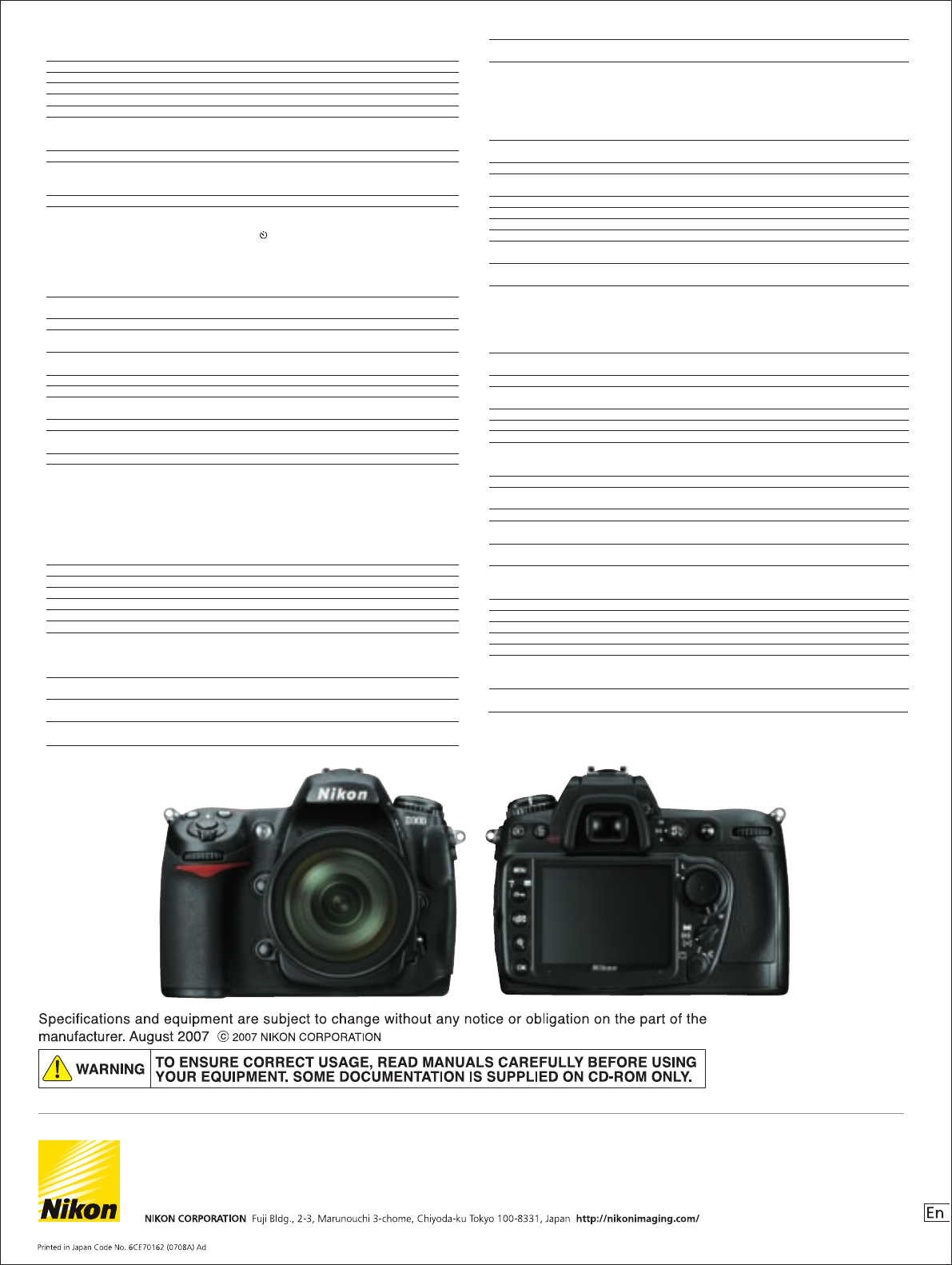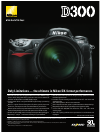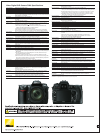
Nikon Digital SLR Camera D300 Specications
Focus Lock
Exposure Metering
System
Exposure Metering
Range
Exposure Meter Coupling
Exposure Modes
Exposure Compensation
Auto Exposure Lock
Auto Exposure Bracketing
Picture Control System
Shutter
Sync Contact
Flash Control
Flash Sync Mode
Built-in Speedlight
Guide number
Flash Compensation
Accessory Shoe
Sync Terminal
Creative Lighting
System
Self-timer
Depth of Field
Preview
Remote Control
GPS
Supported
Languages
Power Source
Tripod Socket
Custom Settings
Dimensions (W x H x D)
Weight
Operating Environment
Supplied Accessories
(may differ by country or area)
Main Optional
Accessories
Focus can be locked by pressing shutter-release button halfway (single-servo AF) or by
pressing AE-L/AF-L button
TTL full-aperture exposure metering using 1005-pixel RGB sensor
1) 3D Color Matrix Metering II (type G and D lenses); color matrix metering II (other CPU
lenses); color matrix metering (non-CPU lenses if user provides lens data; metering performed)
2) Center-weighted: Weight of 75% given to 6, 8, 10, or 13 mm dia. circle in center of frame or
weighting based on average of entire frame (8 mm circle when non-CPU lens is used)
3) Spot: Meters approx. 3 mm dia. circle (about 2.0% of frame) centered on selected
focus point (on center focus point when non-CPU lens is used)
1) 0 to 20 EV (3D Color Matrix or center-weighted metering)
2) 2 to 20 EV (spot metering) (ISO 100, f/1.4 lens, 20˚C)
Combined CPU and AI
1) Programmed Auto [P] with exible program 2) Shutter-Priority Auto [S] 3) Aperture
Priority Auto [A] 4) Manual [M]
5 EV in increments of 1/3, 1/2 or 1 EV
Detected exposure value locked by pressing AE-L/AF-L button
Exposure and/or ash bracketing (2 to 9 exposures in increments of 1/3, 1/2, 2/3 or 1 EV)
Four setting options: Standard, Neutral, Vivid, Monochrome; each option can be adjusted
Electronically-controlled vertical-travel focal plane shutter, 1/8,000 to 30 s in steps of
1/3, 1/2 or 1 EV, Bulb
X=1/250 s; ash synchronization at up to 1/320 s (FP) adjustable with Built-in Speedlight
or optional Speedlight (will reduce GN)
1) TTL: TTL ash control by 1,005-pixel RGB sensor
Built-in Speedlight, SB-800, SB-600 or SB-400: i-TTL balanced ll-ash and standard
i-TTL ash
2) AA (Auto Aperture-type) ash: Available with SB-800 used with CPU lens
3) Non-TTL Auto: Available with Speedlights such as SB-800, 28, 27, and 22S
4) Range-priority manual ash; available with SB-800
1) Front-curtain Sync (normal) 2) Red-eye Reduction
3) Red-eye Reduction with Slow Sync 4) Slow Sync 5) Rear-curtain Sync
Manual pop-up with button release
(ISO 200, m): approx. 17 (manual 18)
(ISO 100 equivalent, m): approx. 12 (manual 13)
-3 to +1 EV in increments of 1/3, 1/2 or 1 EV
ISO 518 Standard hot-shoe contact with safety lock provided
ISO 519 standard terminal
With Speedlights such as SB-800, SB-600, SB-400, SB-R200, supports Advanced
Wireless Lighting, Auto FP High-Speed Sync, Flash Color Information Communication,
modeling ash and FV lock
2 to 20 seconds duration
When CPU lens is attached, lens aperture can be stopped down to value selected by
user (A and M mode) or value selected by camera (P and S mode)
Via 10-pin terminal or Wireless Transmitter WT-4 (optional)
NMEA 0183 (Ver. 2.01 and 3.01) interface standard supported with 9-pin D-sub cable
(optional) and GPS Cable MC-35 (optional)
Chinese (Simplied and Traditional), Dutch, English, Finnish, French, German, Italian,
Japanese, Korean, Polish, Portuguese, Russian, Spanish, Swedish
One Rechargeable Li-ion Battery EN-EL3e, Multi-Power Battery Pack MB-D10 (optional) with one
Rechargeable Li-ion Battery EN-EL4a, EN-EL4 or EN-EL3e or eight R6/AA-size alkaline (LR6), Ni-MH
(HR6), lithium (FR6) batteries, or nickel-manganese ZR6 batteries, AC Adapter EH-5a (optional)
1/4 in. (ISO 1222)
48 settings available
Approx. 147 x 114 x 74 mm (5.8 x 4.5 x 2.9 in.)
Approx. 825 g (1.82 lbs.) without battery, memory card, body cap, or monitor cover
Temperature: 0-40
˚
C/32-104
˚
F, Humidity: under 85% (no condensation)
Rechargeable Li-ion Battery EN-EL3e, Quick Charger MH-18a, USB Cable UC-E4,
Video Cable EG-D100, Strap AN-D300, LCD monitor cover BM-8, Body cap, Eyepiece
Cap DK-5, Rubber Eyecup DK-23, Software Suite CD-ROM
Multi-Power Battery Pack MB-D10, Wireless Transmitter WT-4, Magnifying Eyepiece
DK-21M, AC Adapter EH-5a, Capture NX Software, Camera Control Pro 2
Single-lens reex digital camera
12.3 million
CMOS sensor, 23.6 x 15.8 mm; total pixels: 13.1 million; Nikon DX format
4,288 x 2,848 [L], 3,216 x 2,136 [M], 2,144 x 1,424 [S]
Clean image sensor, image dust-off data acquisition (Capture NX required)
ISO 200 to 3200 in steps of 1/3, 1/2 or 1 EV with additional settings of approx. 0.3, 0.5,
0.7 and 1 EV (ISO 100 equivalent) under ISO 200 and approx. 0.3, 0.5, 0.7 and 1 EV (ISO
6400 equivalent) over ISO 3200
Compliant with DCF 2.0, DPOF and Exif 2.21
NEF 12-bit or 14-bit (uncompressed, lossless compressed or compressed RAW)
TIFF (RGB)
JPEG: JPEG baseline-compliant
CompactFlash (CF) Card (Type I and II, UDMA compliant), Microdrive
1) Single frame [S] mode 2) Continuous low speed [CL] mode: 1 to 7
*1
frames per second
3) Continuous high-speed [CH] mode: 8 frames per second
*1
, 6 frames per second
*2
4) Liveview [LV] mode 5) Self-timer [ ] mode 6) Mirror-up [Mup] mode
*1.
When using AC Adaptor EH-5a/EH-5 or Multi-Power Battery Pack MB-D10 with
batteries other than Rechargeable Li-ion Battery EN-EL3e
*2.
When using Rechargeable Li-ion Battery EN-EL3e
(When shooting in Continuous-servo AF (C), Shutter-Priority Auto [S] or Manual [M]
exposure modes, at a shutter speed of 1/250 s or faster with other settings at default)
Auto (TTL white balance with 1,005-pixel RGB sensor), seven manual modes with ne-tuning,
color temperature setting, white balance bracketing possible (2 to 9 frames in increments 1~3)
Hand-held shooting mode, Tripod shooting mode
3-in., approx. 920,000-dot (VGA), 170-degree wide viewing angle, 100% frame coverage,
low-temperature polysilicon TFT LCD with brightness adjustment
1) Full frame 2) Thumbnail (4 or 9 segments) 3) Zoom 4) Slideshow 5) RGB histogram
indication 6) Shooting data 7) Highlight point display 8) Auto image rotation
Card format, All photographs delete, Selected photographs delete
NTSC or PAL; simultaneous playback from both the video output and on the LCD monitor available
Supports HDMI version 1.3a; Type A connector is provided as HDMI output terminal;
simultaneous playback from both the HDMI output terminal and on the LCD monitor not available
Hi-Speed USB
Up to 36 characters of alphanumeric text input available with LCD monitor and multi-
selector; stored in Exif header
Nikon F Mount with AF coupling and AF contacts
1) DX AF Nikkor: All functions possible
2) D-/G-type AF Nikkor (excluding IX Nikkor lenses): All functions possible (excluding PC
Micro-Nikkor)
3) AF Nikkor other than D-/G-type (excluding lenses for F3AF): All functions except
3D-Color Matrix Metering II possible
4) AI-P Nikkor: All functions except Autofocus, 3D-Color Matrix Metering II possible
5) Non-CPU AI Nikkor: Can be used in exposure modes A and M; electronic range nder
can be used if maximum aperture is f/5.6 or faster; Color Matrix Metering and aperture
value display supported if user provides lens data
Equivalent in 35mm [135] format is approx. 1.5 times lens focal length
SLR-type with xed eye-level pentaprism; built-in diopter adjustment (-2.0 to +1.0 m
-1
)
19.5 mm (-1.0 m
-1
)
Type-B BriteView Clear Matte screen Mark II with superimposed focus brackets and On-Demand grid lines
Approx. 100% (vertical and horizontal)
Approx. 0.94x with 50mm lens at innity; -1.0 m
-1
•TTL phase detection, 51 focus points (15 cross-type sensors) by Nikon Multi-CAM
3500DX autofocus module; Detection -1 to +19 EV (ISO 100 at 20°C/68°F); AF ne
adjustment possible
•Focal plane contrast [in Liveview (Tripod) mode]
Single-servo AF (S); continuous-servo AF (C); manual (M); predictive focus tracking
automatically activated according to subject status in continuous-servo AF
Single AF point can be selected from 51 or 11 focus points
Liveview (Tripod mode): Contrast AF on a desired point within entire frame
1) Single point AF 2) Dynamic Area AF [9 points, 21 points, 51 points, 51 points
(3D-tracking)] 3) Automatic-area AF
Type of Camera
Effective Pixels
Image Sensor
Image Size (pixels)
Dust-reduction System
Sensitivity
File System
Storage System
Storage Media
Release Modes
White Balance
Liveview
LCD Monitor
Playback Function
Delete Function
Video Output
HDMI Output
Interface
Text Input
Lens Mount
Compatible Lenses
Picture Angle
Viewnder
Eyepoint
Focusing Screen
Viewnder Frame Coverage
Viewnder Magnication
Autofocus
Lens Servo
Focus Point
AF Area Mode
© 2007 NIKON CORPORATION
CompactFlash and Extreme are registered trademarks of SanDisk Corporation. Products and brand names are
trademarks or registered trademarks of their respective companies.




